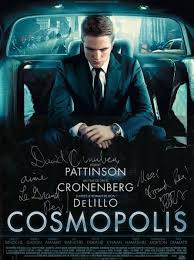
COSMOPOLIS
Canada, 2012, 109 minutes, Colour.
Robert Pattinson, Juliette Binoche, Sarah Gadon, Mathieu Amalric, Jay Baruchel, Kevin Durand, K' Naan, Emily Hampshire, Samantha Morton, Paul Giamatti.
Directed by David Cronenberg.
It requires an initial commitment to stay to watch Cosmopolis, otherwise audiences might be making for the exit quick smart. The commitment is to David Cronenberg and his career and a film of talk and ideas rather than images and action.
Cronenberg has adapted a novel by Don de Lillo. The screenplay is wordy, often poetically wordy, often philosophically or existentially wordy. It often plays more like radio than cinema.
Cosmopolis is a big American city, a financial centre, a city the American president is visiting, a city of protest (which is where the main action sequences are found), a city of enterprise as well as resentment and violence.
For a great deal of the film, the existential tycoon hero is seated in his stretch limousine where underlings communicate with him, where he has a liaison (with Juliette Binoche), where he drives to have a haircut (in fact, only half) and then to answer a mysterious call from a man who wants to shoot him.
Some of the success of the film (or not) depends on response to Robert Pattinson in the central role. In the Twilight series, Pattinson is more of a passive presence and this is the case here. An enigma. He does initiate communication but his manner is more passive than active. Perhaps he is ultimately more of a victim than a hero, but when he comes alive in the final twenty minutes, dramatically playing off Paul Giamatti who makes a powerful impression as the disturbed and disgruntled gunman, he is more impressive.
While there are the action sequences, reminiscent of so many political protests, the action is more a succession of episodes where the mysterious millionaire who manipulates markets and currencies receives a succession of characters from bodyguard to chauffeur, from financial whizkids to women friends (though he does get out of the limousine to go to a diner with a woman friend).
The screenplay has a lot to say about our world, corporations, power and manipulation as well as existential topics of identity and meaning. One can read de Lillo and pause and reflect. Cosmopolis doesn’t always afford that kind of space which means leaving the cinema more puzzled than satisfied.
1. David Cronenberg and his career, audience expectations, themes, philosophy? The visuals?
2. The novel of Don De Lillo, the popular novel, filmable or not? A verbal novel – and the transition to monologues and dialogues on screen?
3. The anonymous city, the title? Universal? Exotic? As seen from the limousine? The presidential visit, terror and fears? The ordinary life in the streets, life in the limousine? The demonstrations? Benno Levin’s house? The musical score?
4. The use of the limousine, the range of equipment, the advice on financial matters, sexual encounters, business deals?
5. Robert Pattinson as Eric? His age, career, success, family, wealth, business acumen? A passive personality? Active? Enigma? The blend of the callow and the deep? The flip and the serious? His being in the limousine? Marriage and money? His aims, the market? Market theories? His paranoia and the questions? Control or destruction? The haircut issue? His discussions with Shiner in the back of the car? Financial theories? The further discussions with Michael? Seeing Elise, getting out of the car, the breakfast, the sexual relationship, the talk, the office? Didi and her coming into the car, the sexual encounter, the discussions? His relationship with his security guard? The discussions with Vija, her advice, financial theories? Going for the haircut, the barber and the talk, the message, his leaving with the haircut half done? His being driven by the chauffeur, the discussions, puzzling where the limousines were held overnight?
6. How well delineated were the characters, just seen in their encounters with Eric: Didi, the guard, Shiner, Michael, Vija? The chauffeur? The barber?
7. The issue of the gun, buying the gun? The message, going to the apartment, finding Levin?
8. Levin, the messy apartment, the toilet, the gun, the shooting? Levin in himself, aged forty-one, the talk, his reflections, his intentions? The shooting? The final questions?
9. The images, the radio? The visuals of the apartment?
10. The demonstrations in the city, the reasons, the presidential visit, the visuals, the crowds, the young, Eric and his reactions?
11. The revelations about Eric? Levin and the issue of the yuan, discussions about patterns of finance?
12. The existential nature of the film, the dialogue, the philosophising? Purpose, life, identity, being known or not, appreciated? Futility?
13. The verbal nature of the film? How cinematic? Audience attention, capacity for reflection?